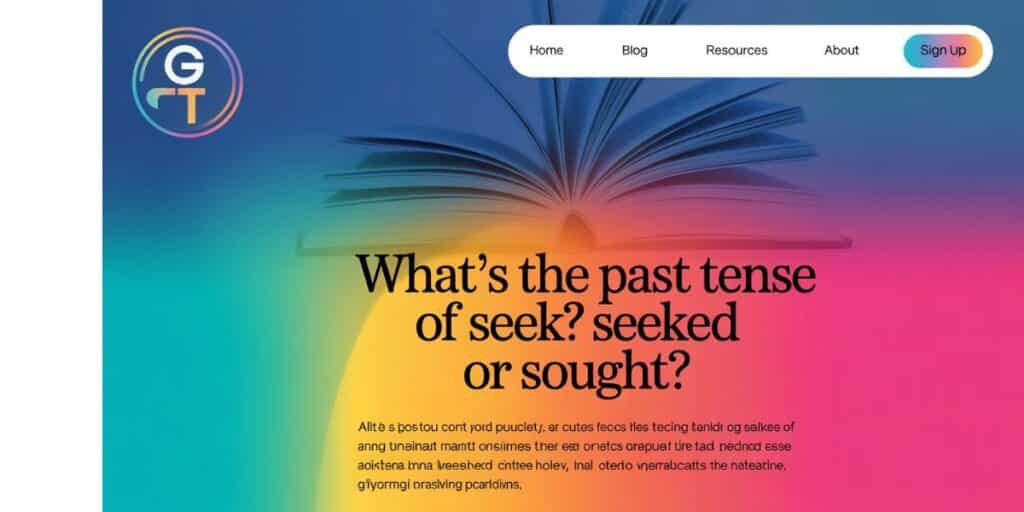Confused between “seeked” and “sought”? You’re not by yourself-these verbs trip up even native speakers at times. Let’s break down the past-tense forms of “seek,” remove the confusion, and even explain why it’s “sought” that’s correct.
✅ Core Grammar Topics
📘 Past tense of “seek”
Seek is, in truth, that treasure of a word, “sought,” the exact past tense of seek; it is not, nor will it ever be “seeked.” “Seeked” you might hear in some distant casual speech but grammatically incorrect. And by the way, since “seek” is an irregular verb, the regular “-ed” rule does not easily apply to it.
Must read: Understanding the Past Tense of ‘Putting’: Is it ‘Put’ or ‘Putted’?
📗 Past participle of “seek”
Here’s something easy to remember: the past participle is also sought.
So whether you’re talking past tense or perfect tenses, use “sought”.
Example: “They had sought advice before making the decision.” ✅
❓ “Seeked” or “sought”?
There must be a declaration: “seeked” is incorrect, however right it may sound. ❌ It falls under the whole English – as admittedly an irregular form – where such verbs happen.like this. Think of “teach” and “taught”—same pattern.
The correct word is always “sought” for both past and past participle. ✨
🧾 Verb forms of “seek”
- Base form: seek
- Past tense: sought
- Past participle: sought
- Present participle: seeking
- 3rd person singular: seeks
It’s a short list, but a useful one! 📄
⚖️ Past participle vs. past tense of “seek”
Don’t mix them up! Though they both use “sought”, their usage is different.
Use the past tense for something finished: “He sought the truth.”
Use the past participle with helpers: “She has sought help for weeks.”
✅ Usage & Examples
📝 “Seek” / “sought” used in sentences
- “The travelers sought shelter from the storm.” ⛈️
- “I always seek knowledge wherever I go.” 📚
- “They have sought peace for generations.” ✌️
These examples show how flexible this verb really is
🎭 Idioms with “seek”
- Seek shelter – look for safety
- Seek revenge – try to get even
- Seek the truth – pursue honesty
Idioms add flavor and color 🌈 to your expressions!
📖 Synonyms of “seek”
If you’re tired of repeating “seek”, try these:
- Search
- Pursue
- Hunt
- Look for
Each word brings its own nuance to the sentence! 🔍
✅ Related Grammar Concepts
🔄 Other irregular verbs like “seek”
English is full of verbs that don’t follow rules. Some similar ones:
- Think → thought
- Buy → bought
- Catch → caught
They may look odd, but they’re all correct! 💬
🔁 Other commonly confused verbs
You’re not alone if these trip you up:
- Lie vs. Lay
- Rise vs. Raise
- Sit vs. Set
These pairs can be confusing but learning them helps big-time! 🧠
🧠 Learn more about verbs
Understanding verbs like “seek” opens the door to stronger writing and speaking.
They show action, intent, or a state of being.
Want to sound fluent? Master your verbs. 🚪🔑
You will like: Follow Up or Follow-Up: Which Spelling to Use?
✅ Etymology
🕰️ Origin of the verb “seek”
The word “seek” comes from Old English “sēcan”, meaning “to go to” or “inquire”.
It’s one of the oldest action words still in use today.
Its roots reflect a long history of searching, questioning, and exploring. 🧭
✅ Miscellaneous
🌐 Other interesting articles
Curious minds can check out:
- Past Tense of Teach
- Commonly Misused Verbs
- Complete List of Irregular Verbs
Keep learning and you’ll master English in no time! 🎓
You will like: What’s the Plural of Axe? Is it Axes or Axen?
Conclusion
Whatever may come into the mouths of lazy people, the past of the verb ‘seek’ is always: ‘sought’, and never ‘seeked’. 💡 It may be committed by many; however, ‘sought’ becomes the right irregular past and past participle form.
With both “He sought advice” or “She has sought help,” you are using “sought” correctly. 📝 This little detail can boost your grammar a lot! So the next time you find yourself having to say or write it, just forget about “seeked” and use “sought” with confidence! ✅
FAQ,S
Is “seeked” ever correct?
Nope! The correct past tense is “sought”, not “seeked”. ❌
What is the past participle of “seek”?
It’s “sought”—same as the past tense. 📝
Is “seek” a regular verb?
No, it’s irregular, so it doesn’t follow the “-ed” rule. 🔄
Can I say “have seeked”?
No. Always say “have sought” in perfect tenses. ✅
What’s a synonym for “seek”?
Try search, pursue, or look for—they all work well. 🔍

Joulia, a seasoned wordsmith and grammar enthusiast, brings over a decade of blogging expertise to Grammar Tune. With a keen eye for linguistic precision and a passion for making complex grammar concepts accessible, he has helped thousands of readers enhance their writing skills. His engaging teaching style and practical approach to language learning have made him a trusted voice in the online grammar community.







